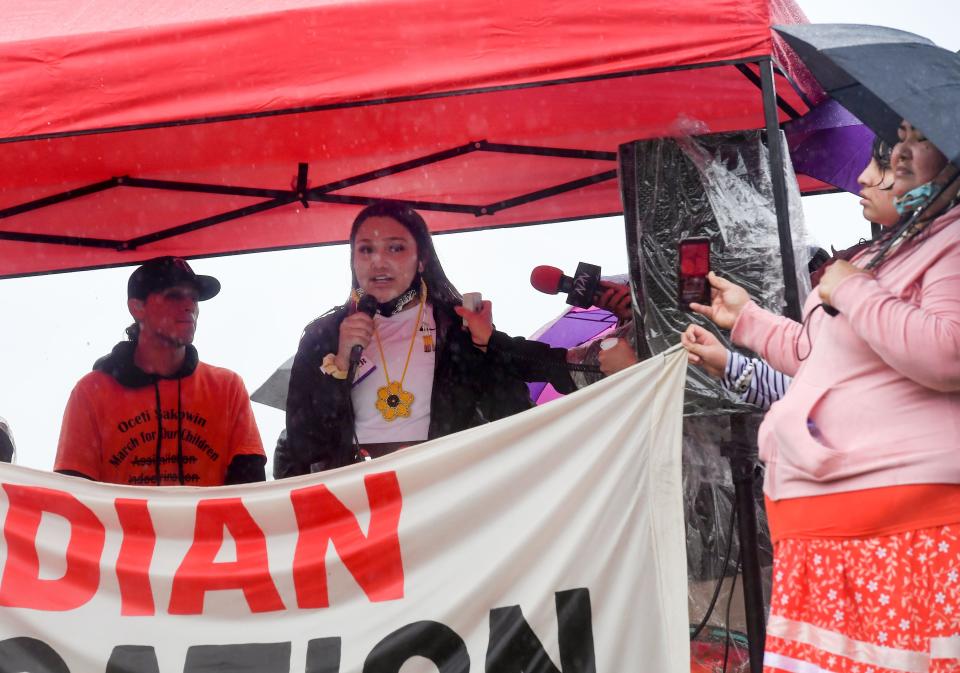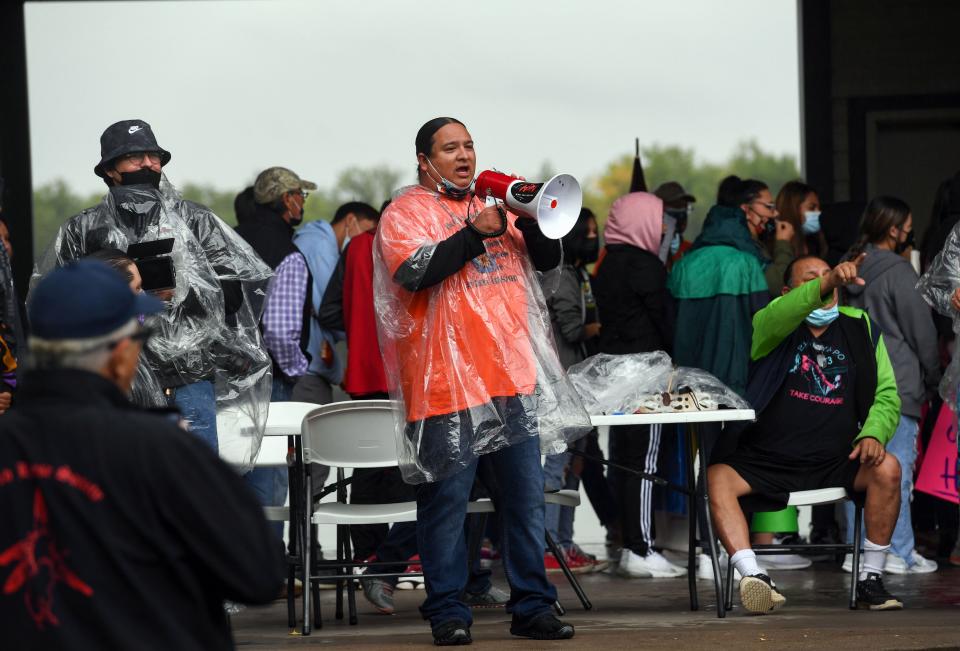'Senseless erasure': The US is reckoning with Indigenous education – from Hawaii to South Dakota to Maine
In South Dakota, Indigenous education advocates are calling for Gov. Kristi Noem and other government officials to resign after more than a dozen references to the Oceti Sakowin were stripped from proposed social studies standards before they were released to the public last month.
South Dakota’s fight for Indigenous inclusion in education was spurred by changes to the standards, but is part of a centuries-long effort by the Oceti Sakowin people – collectively the Lakota, Dakota and Nakota – to reclaim and decolonize their land, history and stories.
But this fight isn’t in South Dakota alone.
While South Dakota is reckoning with Indigenous education, other states are being sued for not including it, and people in California are taking grassroots steps to teach their dying language.
Connecticut, Maine and Oregon have all passed legislation requiring the addition of Native American studies across all school curriculum, with Connecticut requiring the introduction of coursework by the 2023-24 academic year.
Some leaders worry about the enforcement of such requirements, however. In Montana, which is unique in its guarantee for American Indian education laid out since the turn of the century, the state is facing legal action for failing to live up to those standards.

Candi Brings Plenty, an Indigenous justice organizer for the ACLU of South Dakota, said too many public schools fail to teach to their diverse communities, especially Native Americans.
Brings Plenty said 27 states make no mention of Native Americans in K-12 curriculum, and a majority of states' history standards don’t mention Native history past 1900.
Teaching the importance of Native American histories and modern-day contributions to all students can help reduce cultural misunderstandings, racial stereotyping and fear-based ignorance, she adds.
“Students are the next generation of leaders who will move us through the journey to a more just and inclusive democracy,” she said in a statement. “We cannot rob them of the requisite historical knowledge of Indigenous people in our state. The more South Dakota students can learn about our history – the good, the bad and the ugly – and the lessons it can teach us, the better prepared they will be to tackle the inequities and injustices present in our communities.”
Candi’s daughter, Breana Brings Plenty, a 16-year-old junior at Little Wound High School in South Dakota, spoke at an education rally following an Indigenous-led march Monday against the proposed standards in Pierre, the state's capital.
“I’m standing here with my relatives, my brothers and sisters, representing the fight against Noem, who is perpetuating systemic racism on our land,” Breana Brings Plenty said. “Her privilege was built on the shoulders of our ancestors on stolen land, and here we are today in the rain, in the cold, fighting once again.”

South Dakota
The changes to the standards released by the DOE are part of a perpetuated erasure of Indigenous history, experience and perspective, according to organizers of the Oceti Sakowin March for Our Children held Monday.
Members of a workgroup tasked with creating new social studies standards this fall tried to incorporate more Oceti Sakowin topics into those standards – such as culture, traditions, kinship or history – but before the DOE publicly released a draft of the standards on Aug. 6, more than a dozen references to the Oceti Sakowin were taken out.
Some of the workgroup members have called those changes a “present-day erasure of Native Americans,” while others, like Sen. Jim Bolin, a former teacher, said those against the DOE's changes are “making a mountain out of a molehill.”
History curriculum, books were written by and for white people: What about kids of color?
Meanwhile, Noem has said she's looking into recent changes to the proposed standards by way of the state's standard public input process.
The Argus Leader of the USA TODAY Network in August asked Noem’s office her response to the changes, to those who argue the changes are erasure, whether Noem suggested any of the changes to the DOE, how this fits into Noem’s push for more patriotic curriculum, and whether there was a possibility the edits by the DOE could alter relationships with South Dakota’s nine federally-recognized tribes.

Ian Fury, Noem’s communications director, said at the time Noem’s top priority is teaching students a broader understanding of history, including the voices of all South Dakotans in concert with the “building of the most exceptional democracy the world has ever known.”
Sarah White, a leader of the South Dakota Education Equity Coalition and director of education equity for NDN Collective, which is dedicated to building Indigenous power, said the coalition is calling on Noem, South Dakota Secretary of Education Tiffany Sanderson, Tribal Relations Secretary David Flute, and Office of Indian Education director Fred Osborn to resign.
Read more on race and identity: Sign up for USA TODAY’s This Is America newsletter
White said calls for each of their resignations are because of “their blatant and overt violence” committed against the Oceti Sakowin; “erasure that they committed time and time again.”
Other demands include moving the Office of Indian Education back to the South Dakota Department of Education, which Noem moved early on during her first term; honoring laws with tribal consultation on education; and that the state would host a study session on enabling opportunities for Indigenous school choice.

The coalition is also calling for mandatory standards on Oceti Sakowin Essential Understandings, or OSEUs, which are basic understandings of Lakota, Dakota and Nakota culture and history.
Kansas Clifford, a fellow Little Wound student representative, said she and her relatives have inherent rights to learn their complete, unblemished and factual history in school.
"If we dismiss such critical information, who is responsible for this? Who is demanding such impractical, insensitive and senseless erasure?” Clifford said.
Montana
Montana stands alone in its commitment to education on Indigenous topics, embedding a guarantee for American Indian education by way of a constitutional amendment established in 1972 and a bill passed in 1999 known as the Indian Education for All Act (IEFA).
IEFA mandates every public school in the state to teach the distinct and unique heritage of Native Americans in a culturally responsive manner.

The act also directs state and local schools to work with Montana tribes to develop appropriate curriculums regarding American Indian culture and heritage, and mandates all public school personnel have knowledge of tribes and cultures in Montana and are provided the means to acquire this knowledge.
Some Montana educators, like Cynthia Randall at DeSmet School, have used IEFA to teach students more about the Salish tribe who led their school’s namesake, a Catholic missionary, to Montana centuries earlier.
However, this July, the ACLU of Montana and the Native American Rights Fund filed suit against the Montana Office of Public Instruction, alleging the state is failing to meet the obligations lined out in IEFA.
From our editor, to your inbox: Editor-in-chief Nicole Carroll takes you behind the scenes of the newsroom in this weekly newsletter
The lawsuit alleges state public school education of Indians has a “long history of failure and criticism,” and that the state has failed to ensure schools are complying with IEFA.
“They’ve had almost 50 years to try to figure it out again and get it right,” Melody McCoy, staff attorney for the Native American Rights Fund, said. “For some reason, it didn’t happen.”

There are also no standards to determine whether students are learning about American Indian cultural heritage in a culturally responsive manner, and whether schools are working with the tribes to provide instruction or implement educational goals, the lawsuit states.
“It’s not supposed to be like a one-day assembly where we honor Native Americans; it’s integrated into the curriculum: math, science, reading, social studies” and more, McCoy said.
Some districts even report that purchases with IEFA funds are actually inappropriate or harmful. For example, Deer Creek Elementary School purchased the book “Squanto and the Miracle of Thanksgiving,” which according to the lawsuit “approaches the holiday from an evangelical point of view.”
From Maine to Oregon
South Dakota’s neighbors to the north also successfully passed a bill requiring curriculum on Native American culture and history. It requires all of North Dakota’s elementary and secondary schools, public and private, to include Native American tribal history in their curriculum, with an emphasis on tribes within the state.
Similar legislation and efforts have gone through in states like Connecticut, Maine and Oregon.
In Connecticut, where the state’s namesake derives from the Algonquian word for “land on the long tidal river,” The Associated Press reports schools will soon be required to teach Native American studies.

The new legislation makes it mandatory for schools to teach Native American studies by the 2023-24 school year.
Teachers unions and state education commissioner Miguel Cardona, who is now the U.S. education secretary, had raised concerns about the legislation. Cardona said it’s important to teach about Native Americans, but was wary of unfunded mandates for school districts.
In Maine, the Legislature established the Wabanaki Studies Commission in 2001 to support K-12 educators to integrate Native studies into existing curricula.
In Oregon, a similar law took effect in 2019 to provide “historically accurate, culturally embedded, place-based, contemporary, and developmentally appropriate” American Indian and Alaska Native curriculum in five subject areas.
California and Hawaii
Meanwhile, members of the Cahuilla nations across Southern California are working to teach Cahuilla language classes directly to their people, and more university campuses in Southern California are also adopting Cahuilla classes.
The language was on the brink of extinction for years. Now, the COVID-19 pandemic has disproportionately impacted Native Americans and tribal elders, who are historically language keepers.
The boarding school era of the late 1800s had a muting effect on Cahuilla and other Indigenous languages as well, as students weren’t allowed to speak their own languages or practice their own cultures and instead assimilate into English-speaking culture.
'We're still growing': California tribal college pushes forward virtually amid COVID-19

Hawaii leads the nation in teaching native languages, as the only state in the U.S. that has designated a native language, Hawaiian, as one of its two official languages.
The U.S. established English as the only official language in January 1893 in Hawaii when people caught speaking Hawaiian faced severe social ostracism.
By 1983, fewer than 50 children spoke Hawaiian fluently. The state didn’t repeal a long-standing law that banned the Hawaiian language from schools until 1986.
That next year, the Hawaii education department established Hawaiian studies and language immersion programs in light of the state’s constitutional mandate promoting the study of Hawaiian culture, language and history.
The Hawaiian language is now taught in dozens of immersion schools after nearly going extinct.
Contributing: Alia Wong and Jeanine Santucci, USA TODAY
This article originally appeared on Sioux Falls Argus Leader: Indigenous education advocates – from Hawaii to Maine – seek inclusion

 Yahoo Movies
Yahoo Movies 